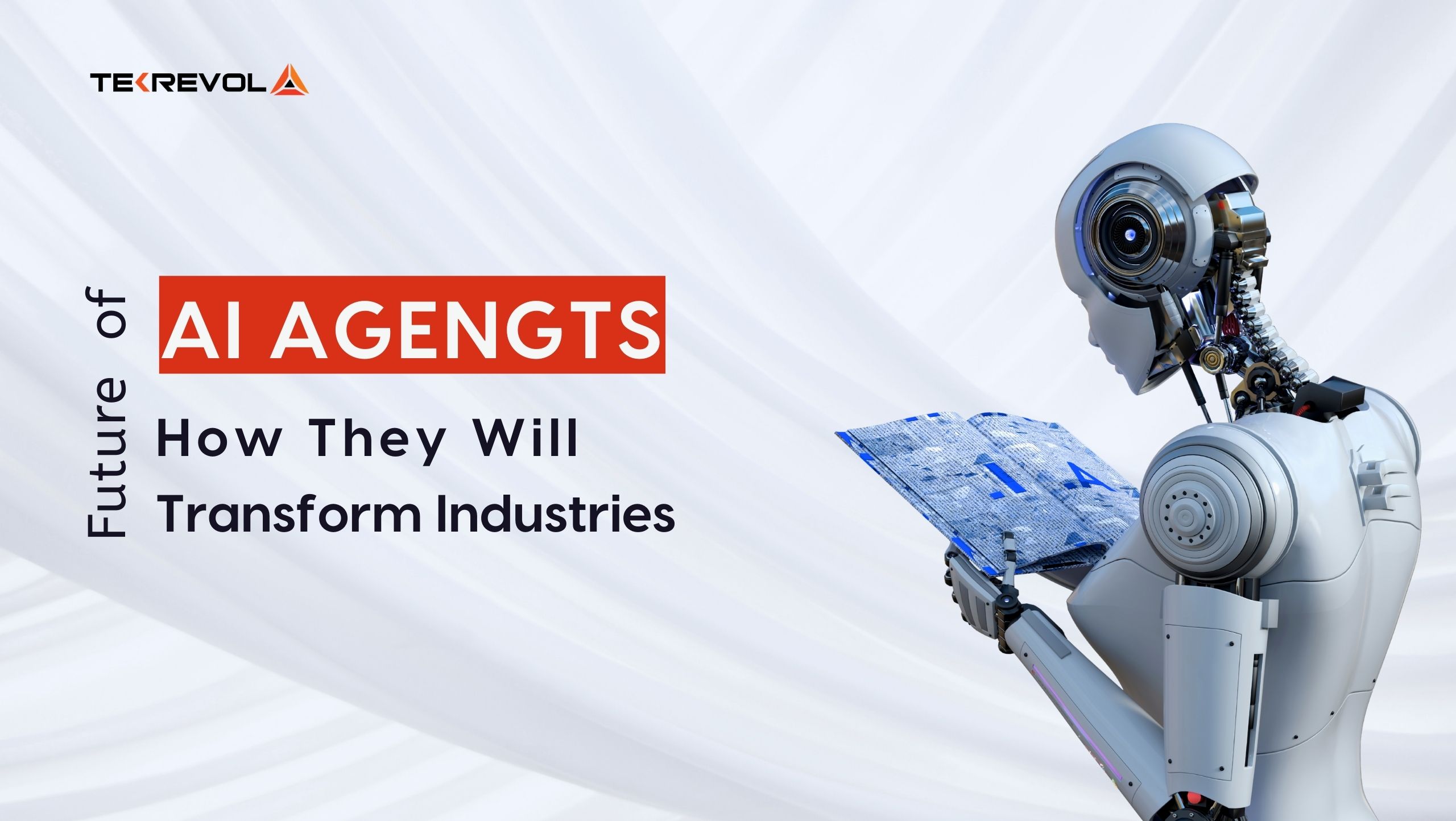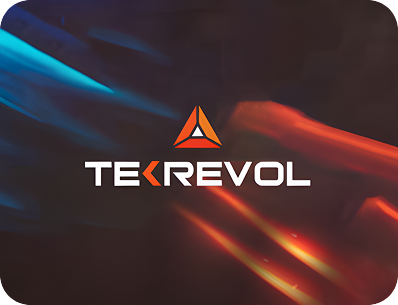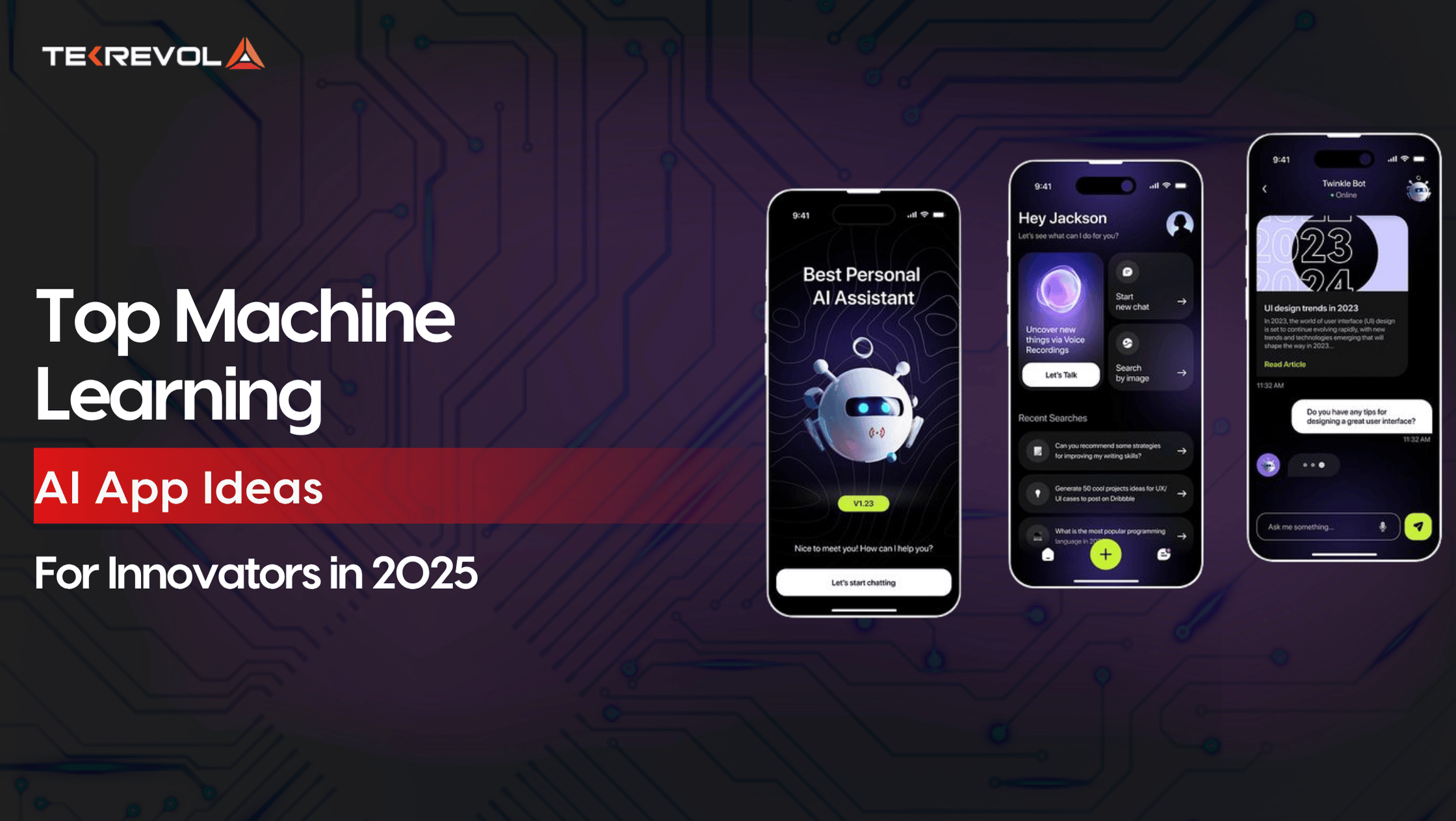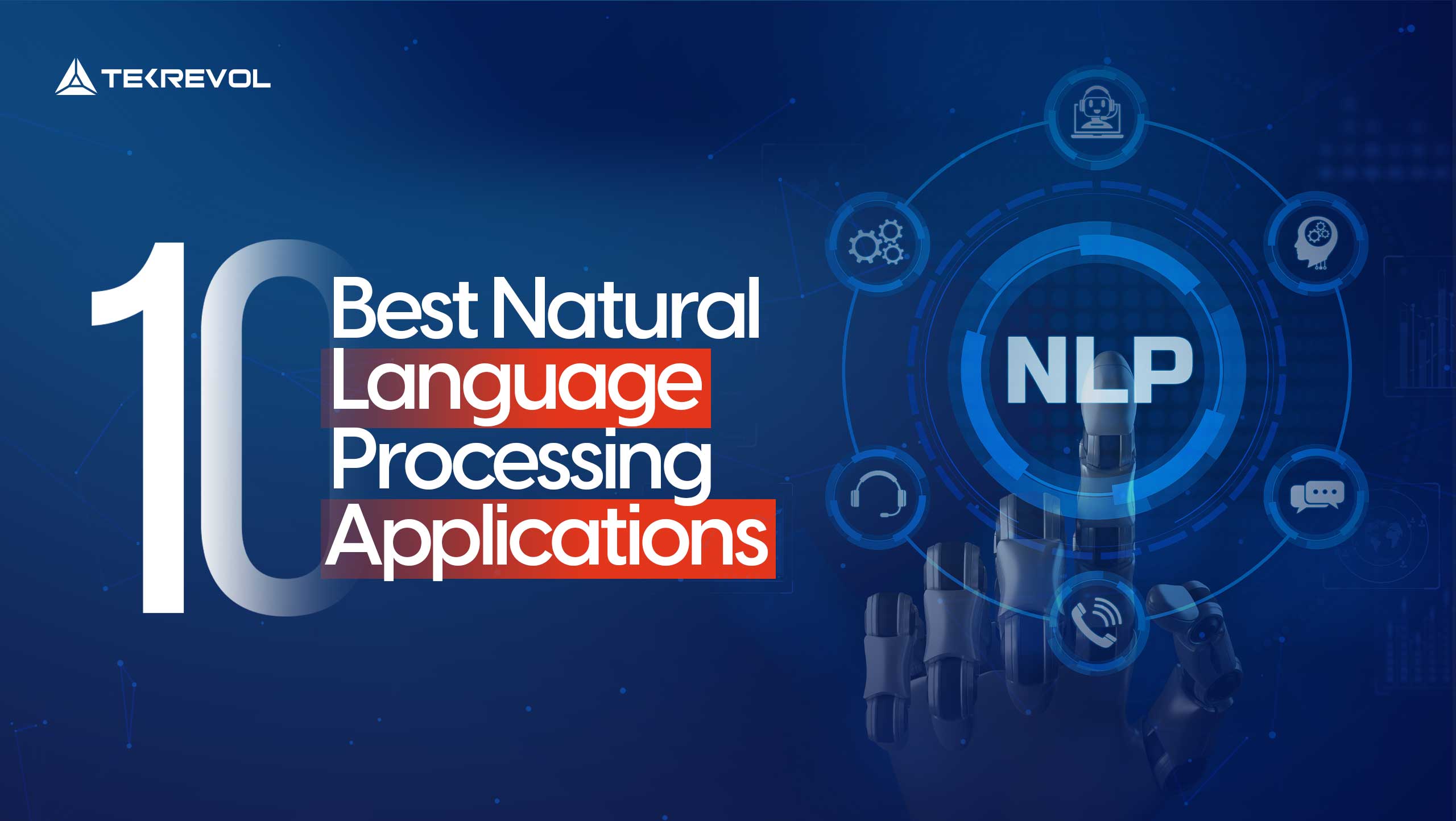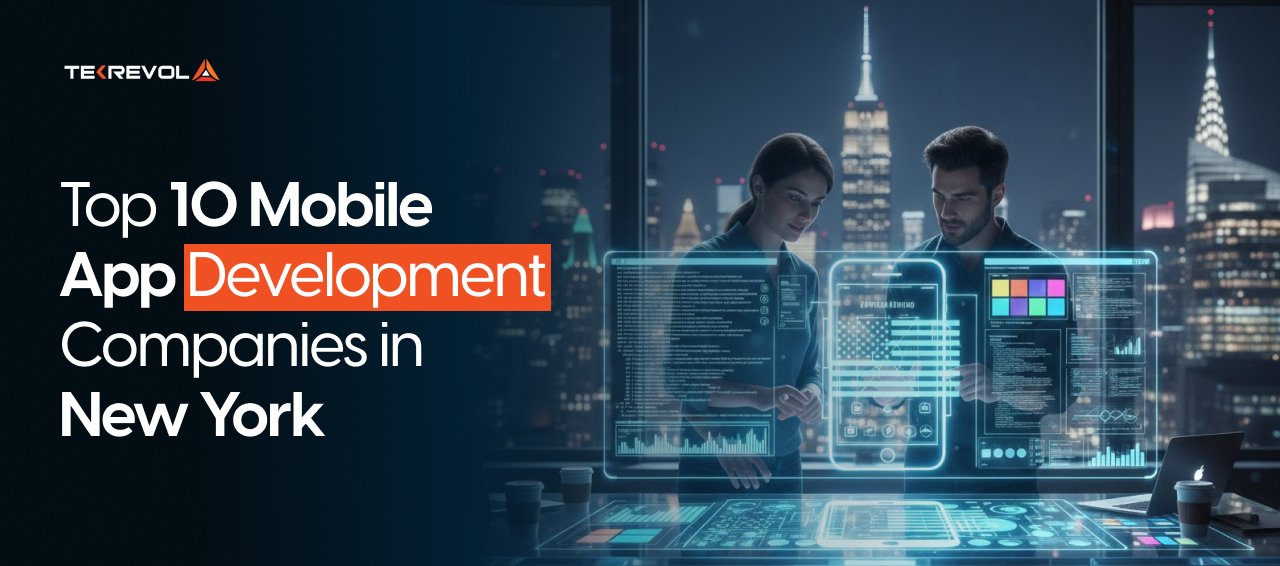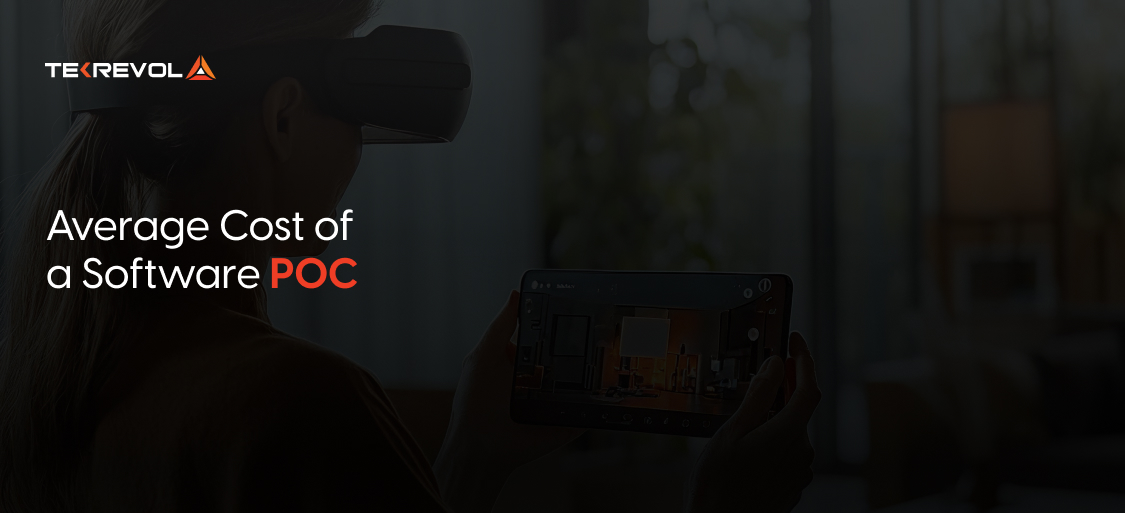According to IBM’s 2025 AI Outlook, 43% of enterprises plan to integrate intelligent agents into core business operations in 2025. A shift isn’t speculative anymore as it’s already in motion.
Since the release of GPT 4.5, we’ve seen a leap from passive chatbots to AI agents that can reason, automate, and act independently. These agents have grown from automating answers to complete tasks, making decisions, and managing workflows.
2025 marks a real turning point. Autonomous systems show results, especially in SaaS, finance, and healthcare. The future of AI agents in business 2025 is less about experiments and more about execution.
In this article, we’ll explore where AI agents are gaining real traction, which jobs are at risk, and how businesses can get ahead with future trends of AI agents before they fall behind.
What Are AI Agents?
AI agents are intelligent systems that can act independently to achieve specific goals. They don’t just respond to commands; instead take action, use tools, and make decisions on their own. These capabilities make them more effective than traditional chatbots, which only react based on set prompts.
The difference comes down to autonomy. While a chatbot needs input to do anything, an AI agent can complete multi-step tasks on its own. It can remember previous steps, interact with apps, and even update data across platforms.
For example, an AI agent can plan a product launch. It pulls market data, generates timelines, and pings your team with updates, eliminating the manager’s need.
What Is the Forecast for AI Agents in 2025 and Beyond?
The AI agent market is growing fast. MarketsandMarkets projects it to cross $22 billion by 2030, driven by enterprise demand for autonomous systems that handle work.
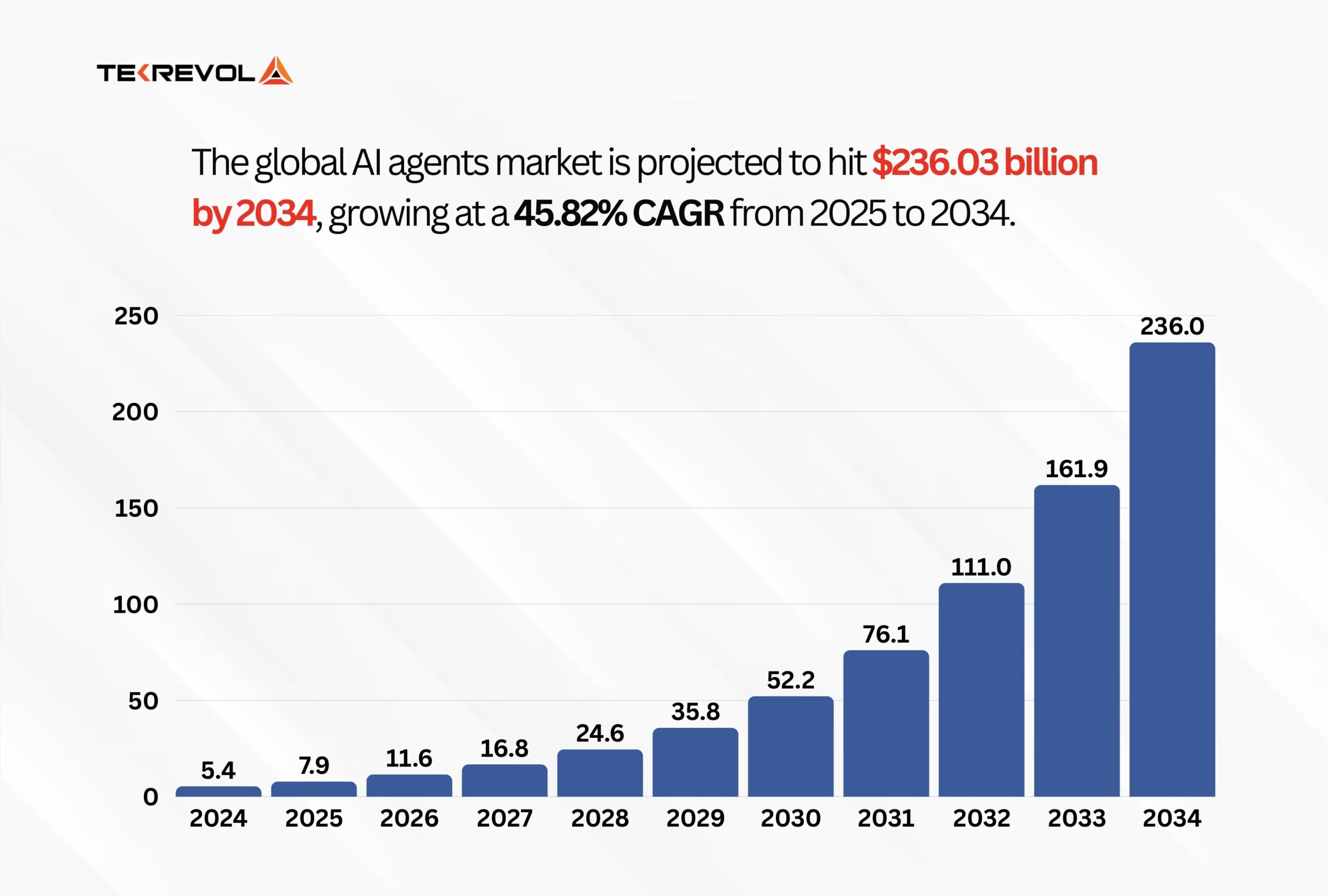
Investors are buying in. PitchBook reports $4.7 billion in funding for AI agent startups since late 2023. Everyone from SaaS leaders to finance giants is racing to build agents that plan, report, and optimize workflows.
These trends point to more than just potential. The future of AI agents 2025 predictions show that adoption is happening faster than it did with chatbots.

Is AI Agent Technology Just Hype?
No, AI agents are not just hype. They’re already being used by companies to automate real work.
Unlike early chatbots or AutoGPT demos that fizzled, today’s agents are practical. They handle scheduling, lead scoring, and even project timelines. Klarna’s AI agent now handles 2 out of 3 customer chats without help from a human.
The AI agents future of work isn’t full autonomy. It’s about removing noise with invisible support systems that reduce busywork and make teams faster.
What Industries Will AI Agents Transform First?
AI agents reshape the structure of those industries that rely on repetitive tasks, rules, and decision-heavy workflows. As per Gartner forecasts, by the end of 2025, 70% of organizations will integrate AI agents into at least one business function, with the fastest growth expected in finance, healthcare, logistics, and SaaS sectors.
Healthcare
Hospitals and clinics already use automation, but agents take it up a level. Using AI agents, they speed up patient intake, automate triage, and reduce admin tasks. These tools improve workflows without replacing clinical expertise..
Companies investing in healthcare app development are integrating agents into appointment systems, symptom checkers, and patient portals to enhance care delivery.
Finance
Finance teams rely on accurate, fast decision-making. AI agents help with reconciliation, real-time risk scoring, fraud detection, and portfolio summaries.
Morgan Stanley’s agents, for example, summarize market research for advisors, saving hours every week. Forward-looking firms exploring fintech software development are now building agent-powered tools to serve both internal teams and end users.
SaaS and Software
The future of SaaS with AI agents is already here. Instead of just building features, companies now embed agents that plan, execute, and improve user experiences.
Platforms like Notion and Salesforce use agents to automate reports and manage projects. Teams investing in SaaS video production are also turning to agents to scale planning, scripting, and distribution with fewer people involved.
Logistics
Logistics is one of the easiest wins for AI agents. These tools update shipments, reroute delays, notify vendors, and cut manual steps from supply chains. Amazon and UPS are testing agent-powered systems to improve routing and reduce delivery times. Businesses working on logistics software development are using similar tech to automate backend processes and increase delivery speed without adding headcount.

Will AI Agents Take Over?
No, AI agents won’t take over. They’ll assist, not replace. These tools are built to reduce grunt work, not remove people. According to PwC, 40% of executives say agent-based systems will enhance human roles, not eliminate them.
Agents handle what humans don’t need to do, activities like tracking deadlines, pulling reports, and updating records. Take them as silent coworkers. They don’t ask for meetings or log tickets. They just work in the background. The future of AI agents isn’t about taking control. It’s about giving your best people more time to think, solve, and build.
What Jobs Will AI Agents Replace?
AI agents will replace jobs involving predictable, rule-based tasks. A Bain & Company study found that firms using AI agents reduce operational headcount by 10–20% in admin-heavy roles. They excel at rule-based workflows, not creative thinking. Here’s a breakdown of where they’re taking over:
| Job Area | Replaced Tasks | Example Use Case |
| Admin & Coordination | Scheduling, status updates, and reminders | Meeting setup, follow-ups, internal updates |
| Data Entry & Ops | Form filling, CRM updates, ticket logging | Auto-sync between tools like HubSpot and Jira |
| Reporting | Dashboard generation, data pulls | Daily sales report built and sent at 9 AM sharp |
| Customer Support | FAQs, order tracking, ticket routing | AI agent resolves 70% of queries before escalation |
| Basic Research | Market summaries, trend scans | Agent compiles insights from 10 sources instantly |
What Jobs Cannot Be Replaced by AI Agents?
Even with autonomy, AI agents still hit limits when it comes to feeling or dealing with emotions. So, roles that rely on human empathy, brain, or context won’t be hurt, at least not anytime soon. Instead, these jobs will be amplified by AI.
Here are the high-value roles agents can’t replace:
| Role Type | Why Agents Struggle | Human Advantage |
| Strategic Leadership | Requires long-term vision, ambiguity handling | Experience, foresight |
| Creative Work | Needs originality, voice, and taste | Emotional insight, storytelling |
| Client Relationship | Depends on trust, subtle cues | Empathy, context reading |
| Healthcare & Therapy | Needs compassion, active listening | Judgment, emotional intelligence |
| Conflict Resolution | No script, no fixed solution | Nuanced decision-making |
Is 2025 the Year of AI Agents?
Yes, 2025 is the breakout year for AI agents. The hype cycle is over, and now OpenAI, Google, Salesforce, and Microsoft have rolled out agentic frameworks and APIs for businesses and dev teams.
Enterprise adoption is spiking. According to IBM, over 42% of global enterprises are expected to use agent-based automation by the end of the year.
Future Trends of AI Agents
The future of AI agents 2025 is not a prediction; it’s happening now. Tools are transitioning from labs to real-world systems. Here are five key trends shaping the next phase of adoption.
1. Embedded Agents in SaaS Products
More SaaS tools now come with built-in AI agents. Instead of being extra, they’re the core feature. Notion, Linear, and ClickUp already use agents to automate planning, research, and reporting. This trend defines the future of SaaS with AI agents.
2. Workflow Autonomy
From ticketing in customer support to handling sprint updates in dev tools, agents are taking over multi-step workflows. GitHub’s Copilot Workspace is one of the first big rollouts built around this kind of autonomy.
3. Rise of Vertical-Specific Agents
We’re seeing agents tailored for finance, healthcare, and logistics. Instead of general-purpose tools, companies now want industry-specific performance.
This shift is accelerating the future of AI agents in business 2025, with tools tuned for compliance, data security, and speed.
4. Human-in-the-Loop Design Models
Agents won’t fully automate everything, and they shouldn’t. Companies now focus on collaboration, where humans make the calls, and agents do the heavy lifting. This model increases accuracy and makes agents more trustworthy across teams.
5. Developer-Focused Agent Platforms
Dev teams now have tools to build agents without starting from scratch. Frameworks like OpenAI’s Assistants API, LangChain, and CrewAI make agent orchestration accessible and fast. This is helping startups go to market quicker with agent-first products.
Each of these trends points to one thing: AI agents are no longer just a tool. They’re becoming the operating layer of modern business.
How Tekrevol’s Custom AI Agents Development Helps Businesses
The future of AI agents in business 2025 starts with systems that work, not just tools that talk. At Tekrevol, our AI agent development services help businesses design and deploy custom AI agents that get things done.
We specialize in workflow automation, product management agents, content strategy bots, and full-stack integrations. Our team doesn’t just build agents. We align them with your business goals, connect them to your tools, and make sure they scale.
Our tailored agent solutions for clients in SaaS, logistics, finance, and healthcare reduce task time by up to 60% and improve internal efficiency across the board.


